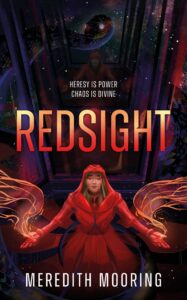
Buy this from Bookshop.org to support local bookstores and the Lesbrary!
Thirst by Marina Yuszczuk, originally published in 2020 and translated this year by Heather Cleary, is a dramatic and lushly gothic novel about two women who a string of circumstances going back over a century bring together in modern day Buenos Aires. Yuszczuk revels in sensual, physical details as she describes how a vampire from Europe emigrates to Buenos Aires when she realizes she can no longer remain undetected in Europe. Decades later, a modern woman struggling with the realities of her mother’s terminal illness and the ongoing effects of grief inherits a key and sets off a collision of destinies. Thirst is a fairly short read (or compact audiobook in my case), and I had a great time because Thirst is a vampire book that revels in being a vampire book. There’s blood and violence and obsession, and at one point a priest is defiled purely out of spite. It’s a sensuous romp, and perfect for heating up an already hot summer.
Thirst, as the title states, is concerned with thirst, both the physical and sexual. The vampire narrator is constantly concerned with her physical thirst for blood and with avoiding vampire hunters that are trying to stop her from satisfying that thirst. It’s interesting to me that she both acknowledges that it’s natural for humans to want to stop her from feeding on them and also asserts that she did not ask to be made into a vampire and that it’s natural for her to want to sustain herself, acknowledging the eternal competition between the two. There’s also tension as she is first forced to flee vampire hunters in Europe and then contend with the developing world of forensic science linking her to her victims. Thirst asks, how do you satisfy your thirst in a world increasingly capable of stopping you?
At the same time, the vampire narrator is also concerned with her more metaphorical thirst. Living outside of society, and thus societal strictures, she revels in her sexuality, taking what she wants whenever she has the whim. While several of her early encounters are with men—who see her as a helpless lone woman they are taking advantage of even as she uses them—she does not shy away from her physical attraction towards women. Even before she meets the modern narrator, she enjoys an interlude with a washer woman who shows her where she can wash her clothes in private. As they undressed together, I enjoyed that the vampire’s physical appreciation of Justine was untainted with any internal hesitation or regrets—as someone who fed intimately on people’s final moments, the vampire felt free to enjoy any physical pleasure she wanted without bias.
The modern narrator she eventually meets up with, on the other hand, is wracked with grief, indecision, and the expectations of others. Her mother is in the final stages of a horrible, untreatable terminal illness that slowly leaves her more and more paralyzed. As her mother disappears bit by bit under medical paraphernalia and pain, she has to grapple with her day to day life and her young son on top of grief and emotionally-draining caregiving. And as she watches her mother’s choices disappear to be made for her by others, the intensity with which the vampire exists attracts her, even as she is startled and alarmed by the violence. Their immediate attraction to each other is electric and visceral—almost feral. Although most of the book was concerned with their individual journeys, I found the chemistry of their meeting compelling, and the ending satisfying.
In conclusion, Thirst is a lush gothic vampire novel that takes lingers on the physical realities of being a vampire, the clash between the vitality of life as an individual and the grind of the realities of existence, and the sensuality that is there for the taking if one dares. Yuszczuk keys into a rich gothic and vampiric tradition without overly lingering on logistics or greater vampire lore. This is a book about the journey and the moment. If you love vampires, Latin American gothic, or just some hot summer defiling of norms, Thirst would be a perfect add to your to-read list. It’s a quick but hot read and a great time.


